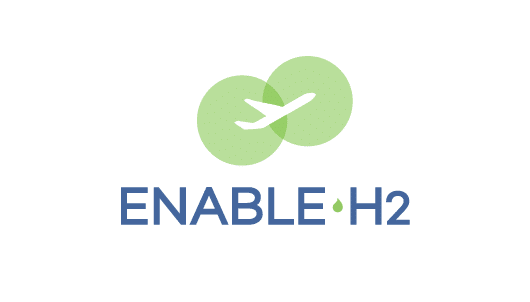enableh2
Flightpath 2050 very ambitiously targets 75% CO2 and 90% NOx emissions reductions, relative to year 2000. It is highly unlikely that these targets will be met with carbon containing fuels, despite large research efforts on advanced, and in many cases disruptive, airframe and propulsion technologies, even when coupled with improved asset and life cycle management procedures. Liquid hydrogen (LH2) has long been seen as a technically feasible fuel for a fully sustainable aviation future yet its use is still subject to widespread scepticism. ENABLEH2 will mature critical technologies for LH2 based propulsion to achieve zero mission-level CO2 and ultra-low NOx emissions, with long term safety and sustainability. ENABLEH2 will tackle key challenges i.e. safety, infrastructure development, economic sustainability, community acceptance, and explore key opportunities through improved combustor design and fuel system heat management, to further minimize NOx emissions, improve energy efficiency and reduce the required volumes of LH2. The project will include experimental and analytical work for two key enabling technologies: H2 micromix combustion and fuel system heat management. These technologies will be evaluated and analysed for competing aircraft scenarios; an advanced tube and wing, and a blended wing body / hybrid wing body aircraft, both featuring distributed turbo-electric propulsion systems and boundary layer ingestion. The study will include mission energy efficiency and life cycle CO2 and economic studies of the technologies under various fuel price and emissions taxation scenarios. ENABLEH2 will deliver a comprehensive safety audit characterising and mitigating hazards in order to support integration and acceptance of LH2. Solutions will be proposed for any socioeconomic hurdles to further development of the technologies. A roadmap to develop the key enabling technologies and the integrated aircraft and propulsion systems to TRL 6 by 2030-2035 will be provided.
PROJECT STRUCTURE

eXPECTED rESULTS
ENABLEH2 will revitalise the enthusiasm in liquid hydrogen research for civil aviation. It will demonstrate that switching to hydrogen is feasible and must complement research and development into advanced airframes, propulsion systems and air transport operations. Combined, these technologies can more than meet the ambitious long-term environmental and sustainability targets for civil aviation.
More specifically ENABLEH2 will:
- Quantify the mission-level and long term life cycle emissions and costs benefits (and therefore the economic viability) associated with the introduction of LH2 for civil aviation relative to best case scenario projections for Jet-A1, drop-in bio-fuels and LNG (for a range of plausible, hypothetical fuel price and emission taxation scenarios).
- Mature ultra-low NOx hydrogen micromix combustion technologies to TRL4
- Mature the LH2 fuel system heat management system to TRL 2
- Mature compressor integrated cooling and intercooling and variable cooling to TRL 4
- Deliver a comprehensive safety audit, characterizing and mitigating hazards in order to support integration and acceptance of LH2 for civil aviation at aircraft, airport and operational level
- Alleviate perceived industry and public concerns regarding LH2 for civil aviation via effective dissemination of the outcomes of the project through amongst other channels, a dedicated Network and Community
- Provide comprehensive roadmaps for the introduction of LH2 for civil aviation


